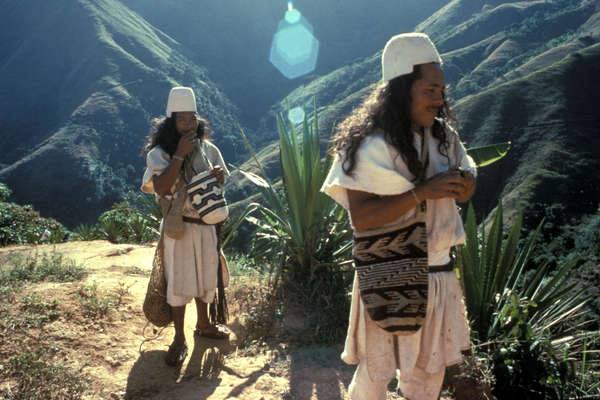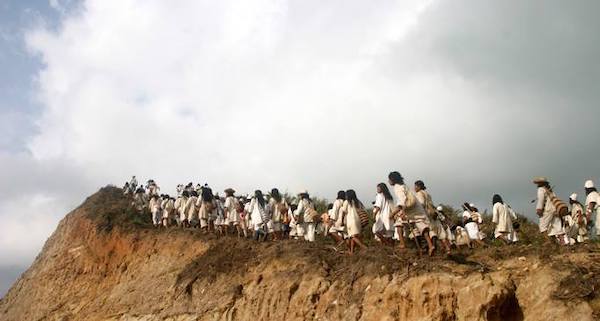SIERRA NEVADA (Colombia) COFFEE
Sierra Nevada is one of the world’s most unique regions in Colombia. It is a mountain of 5,800 meters above sea level and 42km from the seashore that enjoys all thermal floors. UNESCO declared it a Biosphere Reserve and World Heritage Site in 1979. Grown under the shade of native forests, Sierra Nevada Coffee is an intense beverage with notes of hazelnut and dark chocolate.
Sierra Nevada has around 15,322 coffee growers who mainly come from Indigenous ethnicities such as the Arhuaca, Wiwa and Kogui.

The culture behind the Sierra Nevada Coffee
Indigenous coffee growers adopted the coffee growing culture according to their beliefs, growing coffee with organic materials and with a profound respect for mother earth.
For these indigenous coffee growers, coffee is full of flavor and spirituality. This makes it unique. Throughout the entire process, they show their gratitude through rituals that help fertilize their fruits with positive energy.
This pyramidal shape mountain contains all thermal floors and the different ecosystems that make up the rainforest, the forest, and the Andean highlands. Its proximity to the sea creates a unique microclimate with higher relative humidity, which provides coffee its greater intensity and body.
What is special about the Sierra Nevada Coffee?
It is said to be one of the most valuable coffees in the world. Only 450 families in Colombia produce this coffee that grows in an area that was not originally a coffee-producing área. Few authorized distributors have it for it is extremely difficult to access those families and obtain authorization to sell.
Where is the Colombian Sierra Nevada coffee grown?
This coffee is cultivated under the shade of native trees (like the coffee Walnut and the Guamo Santafereño) that grow in the so-called ‘ Caribbean Café Belt ‘, formed by four municipalities of the Magdalena department: Aracataca, Santa Marta, Ciénaga and Foundation. There, coffee plants grow in heights between 800 and 1,600 meters above sea level and are cultivated by indigenous and peasant families who do not use chemicals.

What certifications does the Sierra Nevada coffee have?
The Sierra Nevada coffee from Colombia has obtained various accreditations, under international standards of organic agriculture; For example, the ecological seal of the Ministry of Agriculture and Rural Development, and Fairtrade certification or fair trade, which guarantees the consumer that, with his purchase, he/she is contributing to the improvement of the quality of life of the producers.
This 100% organic coffee is grown and harvested by coffee growing families that have adopted principles of organic/ecological agriculture. This coffee has a balanced flavor with wild notes.
By ancestral tradition, and harmoniously living with Mother Nature, the indigenous communities of the Sierra Nevada de Santa Marta do not use chemicals for coffee growing, something that markets increasingly value, besides its unique cup attributes.
The words of a Native
Oliveiro Villafana, an arhuaco native of the Sierra Nevada de Santa Marta, is part of the 778 coffee growers, mostly indigenous and farmers, who produce coffee under strictly organic protocols and are part of the Colombian Coffee Growers Federation (FNC) select offer of organic coffees.
As Oliveiro himself explains, organic coffee comes from an ancient tradition that has become their way of life, achieving a balanced production based on rational use of natural resources and ensuring a stable agricultural production in the long term.
“We, the indigenous people of the Sierra Nevada (Snow-Capped Mountain Range), have a philosophy: we don’t apply synthetic products to coffee and grow it naturally. In our daily life we have the mission of living in harmony with Mother Nature and all living beings; for this reason we do not use any chemical that may affect those living beings around us. On the other hand we see that organic coffee has become a fashion, but for us it is not a fashion, it’s something that we naturally grow as a cultural tradition, because our ancestors have taught us so,”he explains.
Thanks to this, organic coffee from the Sierra Nevada has become a Colombian reference worldwide. It belongs to the category of specialty coffees and has a growing demand by specialized buyers from such countries as Japan, South Korea, the United States and Germany, which have an increasing organic culture and find differential and unique attributes in this coffee in terms of organic production, since it combines three essential factors such as origin, production conditions and differentiated cup.
It is worth noting that the FNC has been a key piece to build and create long-term commercial relationships between communities that grow organic coffee, customers and consumers, focusing on self-sustainable economic development and cultural strengthening of producers, which has translated into higher incomes and well-being for themselves and their families.
“We market our coffee clearly thinking that it’s a service to society and this gives us an added value; buyers are aware of what we are producing, a totally organic coffee, and of the fact that behind every coffee crop, there is a history. By explaining all this, buying countries really understand what is an organic product and the support they give, through their purchase, to indigenous communities, and of course to improvement of each producer’s quality of life,” Villafana underlines.
In addition, the programs of organic and specialty coffees from the Sierra Nevada, leveraged by the FNC through Departmental Coffee Growers Committees, the Extension Service and the Commercial Office, have promoted and encouraged associativity, involving different indigenous ethnic groups and small coffee growers, to improve their living conditions and look for ways to increase coffee production.
At the same time, the associations are highly committed to preservation of the Sierra Nevada, growing coffee under different schemes of sustainable production that involve certification and/or verification processes (indispensable when exporting) such as Fair Trade, Rainforest Alliance, 4C, UTZ and FLO (organic).The latter for example promotes fair trade and improves access to markets and trade conditions of small coffee growers.
“Coffee is the only product that enables us to have a stable economy. Coffee has become the salary of indigenous people in the Sierra Nevada de Santa Marta.”
Oliveiro Villafana
Sierra Nevada de Santa Marta, an ancestral land producing specialty coffee
The coffee-growing departments of Magdalena, Cesar and La Guajira, in Northern Colombia, encompass this imposing mountain system, considered the highest coastal mountain range in the world, with a height of 5,775 masl, and recognized by the Unesco as a world heritage site and biosphere reserve.
Thanks to production conditions, which exclusively depend on climatic factors, the Sierra Nevada coffee is a differentiated and origin product. It has pronounced aroma, high body, good bean size, minimum acidity and ancestral growing. There is a single harvest per year, between October and December, which gives it a character of limited edition, taking into account that the rest of the country has two harvest seasons.
